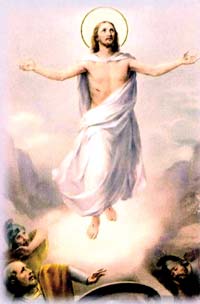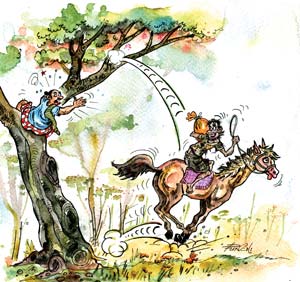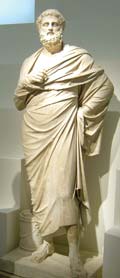|

Why Easter varies from year to year
The Spring Equinox ushers in a time of rejoicing and celebrating the
awakening of the Earth from the long winter sleep, it is a time when the
warm Sun and green grass are beginning to push aside the snow and ice
and the dreary (gloomy)cold of winter.
 Before
the Christians began celebrating the Resurrection or Christ's rising
from the dead, at this time of the year, people in those northern
countries in Europe were greeting spring with celebrations.Easter the
English word for the Christian celebration comes from Eastre, the name
of an Anglo-Saxon goddess of light. Anglo-Saxon tribes who lived in
ancient Briton held a festival in her honour in early April. Before
the Christians began celebrating the Resurrection or Christ's rising
from the dead, at this time of the year, people in those northern
countries in Europe were greeting spring with celebrations.Easter the
English word for the Christian celebration comes from Eastre, the name
of an Anglo-Saxon goddess of light. Anglo-Saxon tribes who lived in
ancient Briton held a festival in her honour in early April.
The Christian celebration Easter, is connected with the equinox.
Easter Sunday as you all know is not on a fixed date like Christmas. The
day varies from year to year. Why?
In the beginning, the followers of Christ didn't know the exact day
of the Resurrection. It was after the Council of Elders of the Church,
held in 325AD in Nicene in Anatolia in eastern Turkey, that a date was
fixed for Easter. It was to be on the first Sunday after the first full
moon after the equinox on March 21. So, the earliest possible date of
Easter is March 22, (the full moon coinciding with March 21 and March 21
being a Saturday). The latest is April 25.
This year the first full moon after the equinox was on April 9
Thursday. Therefore, Easter is on Sunday April 12 and Good Friday was on
April 10. Last year March 21 (equinox) Friday was full moon day. So,
Easter was on Sunday March 23. Good Friday and full moon day coincided.
The previous year (2007) the first full moon day after the equinox was
Monday April 2 and Easter was on April 8. Good Friday was on April 6.
If you have old diaries look them up. You will see how Easter varies
with the first full moon after the equinox. In 2003 Easter was late, it
was after the Sinhala and Tamil New Year. Easter Sunday was on April 20,
because the full moon after the equinox was on Wednesday April 16,
followed by Good Friday on April 18.
Sumana Saparamadu
How the beggar took Gamarala's family
for a ride
 Short
Story: Short
Story:
Once upon time, there lived a Gamarala and his wife who had a
daughter by the name of Kaluhamy. They loved her dearly, for she was the
only child they had. But unfortunately, she died at an early age and
this saddened the parents very much.Not long after this sad event, there
came a very lean beggar to the house when the Gamarala was out in the
field. Seeing the miserable state of the beggar, the sorrowing mother of
Kaluhamy took pity on him and inquired as to how he had got so lean. The
beggar replied "Elova gihin melova ava" (I have just returned from the
other world.)
He meant, of course, that he had been very, very ill recently and
just escaped death. But the foolish woman thought that he had really
gone to the other world, and asked him if he had not seen her daughter,
Kaluhamy, there.Seeing that the woman was a very foolish person, the
begger gave a cunning answer. He said, "Of course, I knew Kaluhamy
there. In fact, it was I who married her". The old woman believed his
story and showed her supposed to be son-in-law great affection. She gave
him good things to eat, and later, all the jewels and silks she had, to
be taken to her daughter as her dowry. The beggar went away with them
without losing much time.A short while later, the Gamarala returned home
and when he heard what had happened he flew into a rage. He found fault
with his wife for having acted foolishly, and mounting his horse, he
chased after the begger. In a short time he saw the begger and was about
to overtake him. Thereupon the beggar climbed a tree, but the Gamarala
followed him there too. The beggar, climbed down the tree with the help
of a branch, and untying Gamarala's horse that was tied to the tree,
rode off on it as fast as he could.The Gamarala was still on the tree
and found that nothing could be done. Therefore he shouted after the
fleeing beggar, "Son-in-law! Son-in-law! Tell my daughter Kaluhamy, that
the jewels are from the mother, but the horse is from the father."
Asha Senevirathne
Controlling your temper
 Socrates,
the great Greek philosopher, tried hard to control himself and was
resolved never to make a show of his temper. He believed that an angry
man was more of a beast than a human being. Socrates,
the great Greek philosopher, tried hard to control himself and was
resolved never to make a show of his temper. He believed that an angry
man was more of a beast than a human being.
He had a wife who lost her temper at the slightest excuse and tried
her utmost to irritate the cool and calm philosopher. One day, the woman
became more furious than ever, and began to insult Socrates.
Determined not to be put out, Socrates thought it best to leave her
alone and went out and sat on the doorstep of his house, looking out on
the public street.
Realising that Socrates, was not paying the least heed to her
scolding, his wife went up to him and emptied a basinful of water over
him. The passers-by in the street were much amused by the incident, and
Socrates joined them in their laughter and quietly remarked, "I was
expecting this; after thunder comes rain".
- A.S. |

